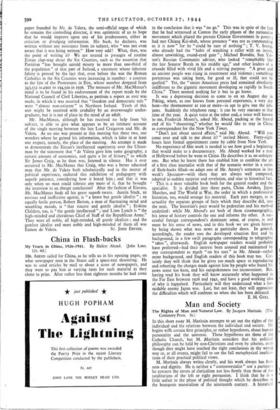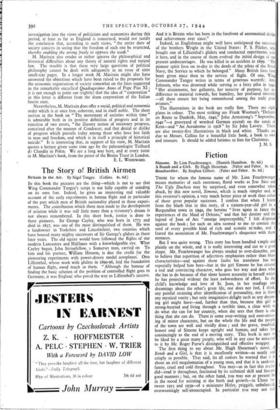Man and Society
The Rights of Man and Natural Law. By Jacques Maritain. (The Centenary Press. 5s.)
IN this short essay M. Maritain attempts to set out the rights of the individual and the relations between the individual and society. He begins with certain first principles, or rather hypotheses, about human personality and the universe. These hypotheses are those of the Catholic Church,' but M. Maritain considers that his political philosophy can be held by non-Christians and even by atheists, even though they might have reached the right conclusions in the wrong way or, at all events, might fail to see the full metaphysical implica- tions of their practical political views.
M. Maritain always writes clearly, and his work always has fine- ness and dignity. He is neither a " controversialist " nor a partisan he corrects the errors of clericalism not less firmly than those of the totalitarians of the left or right persuasion. I think that he is a little unfair to the phase of political thought which he describes as the bourgeois materialism of the nineteenth century. A historical
investigation into the views of politicians and economists during this period, at least as far as England is concerned, would not justify the conclusion that, according to such views, "the entire duty of society consists in seeing that the freedom of each one be respected, thereby enabling the strong freely to oppress the weak."
M. Maritain also evades or rather ignores the philosophical and historical difficulties about any theory of natural rights and natural law. The trouble is that these very large questions of political philosophy cannot be dealt with adequately in an essay of sixty small-size pages. In a longer work M. Maritain might also have answered the objections which have been raised to the proposals for the economic organisation of society somewhat on the lines suggested in the remarkable encyclical Quadragesimo Anna of Pope Pius XI; it is not enough to point out (rightly) that the idea of " corporation " in this letter is different from the sham corporatism of the Italian fascist state.
Nevertheless, M. Maritain does offer a social, political and economic order which is at once free, coherent, and in itself noble. The short section in the book on "The movement of societies within time" is admirable both in its positive definition of progress and in its rejection of two errors, "the illusory notion of necessary progress, conceived after the manner of Condorcet, and that denial or dislike of progress which prevails today among those who have lost faith in man and freedom, and which is in itself a principle of historical suicide." It is interesting that, in support of his view, M. Maritain quotes a lecture given some time ago by the paleontologist Teilhard de Chardin in Pekin. We are a long way here, and at every point in M. Maritain's book, from the patter of the Brains Trust in London.
E. L. WOODWARD.



























 Previous page
Previous page